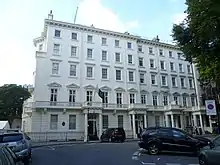Pakistan–United Kingdom relations
Pakistani–British relations are the relations between Pakistan and the United Kingdom. Both Pakistan and the United Kingdom are members of the Commonwealth of Nations[1] and the United Nations.[2]
 | |
Pakistan |
United Kingdom |
|---|---|
.jpg.webp)
History
Formerly part of the British Empire, Pakistan became independent from the UK in 1947 under the terms of the Indian Independence Act.[3] At this point the Dominion of Pakistan was still nominally part of the British Empire, until it became a separate Republic in 1956.[4]
Pakistan left the Commonwealth of Nations in 1972 in protest of the organisation's recognition of Bangladeshi independence,[5] before rejoining in 1989.[6]
In 2018, Pakistan and the United Kingdom signed the UK-Pakistan Prisoner Transfer Agreement allowing foreign prisoners in both countries to serve their sentences in home country.[7]
Diplomatic relations

The United Kingdom and Pakistan have High Commissioners, a position which often fulfills the role ambassador within the Commonwealth,[8] in the other country. The current High Commissioner for the UK in Pakistan is Christian Turner,[9] and Pakistan's High Commissioner to the UK is currently Mohammad Nafees Zakaria.[10]
Economic relations
Since 1988 there has been a tax treaty in place between the two countries designed to prevent individuals or businesses being taxed for the same income twice, and to prevent tax avoidance.[11]
In 2012 the Prime Ministers of both countries launched a Trade and Investment Roadmap to increase trade between the countries.[12] Chaudhry Nisar Ali Khan, Pakistani Interior Minister, recently stated bilateral visits between the countries would be arranged to support trade relations.[13]
A Pakistan–Britain Advisory Council was setup in 2002 to look at how the two governments could facilitate trade and commercial connections between the two countries.[14]
Military relations
Both nations were part of a Cold War alliance called the Central Treaty Organization, which the UK saw as important in containing the expansion of Soviet influence in the region, while Pakistan joined partly in the hope of attracting economic benefits from the West.[15] Pakistan's intelligence agency the ISI was formed by British officers in their departure from India, the ISI maintains extensive links with UK intelligence services and operations inside the UK.[16] The British government regards the Baluchistan Liberation Army as a terrorist organization, it was proscribed in July 2006.[17] Regular meetings and discussions on national security and counter-terrorism regularly take place between the governments of the two countries.[18]
Position on Kashmir dispute
The Prime Minister of the United Kingdom Boris Johnson has stated that Kashmir is an "Indian Union Territory" in the British parliament
See also
References
- "Member countries Commonwealth". The Commonwealth. Retrieved 24 November 2016.
- "Member States of the United Nations". United Nations. Retrieved 24 November 2016.
- Romein, Jan (1962). The Asian Century: A History of Modern Nationalism in Asia. Berkeley and Los Angeles: University of California Press. p. 357. Retrieved 23 March 2017.
- "After partition: India, Pakistan, Bangladesh". news.bbc.co.uk. 8 August 2007. Retrieved 24 March 2017.
- "Profile: Commonwealth of Nations - Timeline". BBC News. BBC. 26 September 2014. Retrieved 23 March 2017.
- "Pakistan". The Commonwealth. The Commonwealth. Retrieved 23 March 2017.
- "Pakistan, UK sign prisoner transfer agreement". Dawn.
- Lloyd, Lorna (2007). Diplomacy with a difference : the Commonwealth Office of High Commissioner, 1880-2006 ([Online-Ausg.]. ed.). Leiden and Boston: Nijhoff. pp. 1–6. ISBN 978-90-04-15497-1. Retrieved 23 March 2017.
- "British High Commission Islamabad". gov.uk. KM Government. Retrieved 23 March 2017.
- "Nafees Zakaria assumes responsibilities as Pakistan's high commissioner to UK". Pakistan Today. Retrieved 22 January 2019.
- "UK/Pakistan Double Taxation Convention" (PDF). gov.uk. 24 November 1986. Retrieved 24 March 2017.
- "UK-Pakistan joint statement". www.gov.uk. 10 May 2012. Retrieved 24 March 2017.
- "PM sees bright prospects for Pakistan-UK trade ties". Gulf-Times. 21 March 2017. Retrieved 24 March 2017.
- "Pakistan, UK to expand trade: Advisory group report presented". dawn.com. Dawn. 27 April 2002. Retrieved 24 March 2017.
- Kechichian, J. A. "Baghdad Pact". www.iranicaonline.org. Encyclopaedia Iranica. Retrieved 24 March 2017.
- Gardham, Duncan (12 August 2011). "'Pakistani spies' in the Houses of Parliament". Telegraph. Retrieved 24 November 2016.
- "Proscribed terrorist organizations" (PDF). Home Office, United Kingdom. 15 July 2016. Retrieved 24 November 2016.
- Hague, William (27 September 2011). "Britain's relationship with Pakistan is here to stay". gov.uk. Retrieved 24 March 2017.
External links
| Wikimedia Commons has media related to Relations of Pakistan and the United Kingdom. |